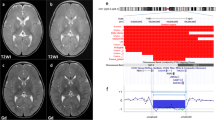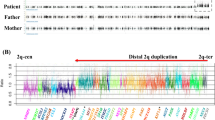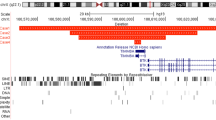Abstract
CHROMOSOME deletions are ideal material for identifying gene loci, by the correlation of the absence of part of a chromosome with a particular phenotype. We have recently studied a child who demonstrates this cytogenetic principle. A 26 month old mildly retarded Caucasian female was found to be heterozygous for a deletion of the long arm of chromosome 16. Analysis of autosomal marker systems in the propositus and her family suggests that the location of the genes determining the Duffy blood system might be on the chromosome 16.
This is a preview of subscription content, access via your institution
Access options
Subscribe to this journal
Receive 51 print issues and online access
$199.00 per year
only $3.90 per issue
Buy this article
- Purchase on Springer Link
- Instant access to full article PDF
Prices may be subject to local taxes which are calculated during checkout
Similar content being viewed by others
References
Race, R. R., and Sanger, R., Blood Groups in Man (Blackwell Scientific Publications, 1962).
Author information
Authors and Affiliations
Rights and permissions
About this article
Cite this article
CRAWFORD, M., PUNNETT, H. & CARPENTER, G. Deletion of the Long Arm of Chromosome 16 and an Unexpected Duffy Blood Group Phenotype reveal a Possible Autosomal Linkage. Nature 215, 1075–1076 (1967). https://doi.org/10.1038/2151075a0
Received:
Issue Date:
DOI: https://doi.org/10.1038/2151075a0
This article is cited by
Comments
By submitting a comment you agree to abide by our Terms and Community Guidelines. If you find something abusive or that does not comply with our terms or guidelines please flag it as inappropriate.



